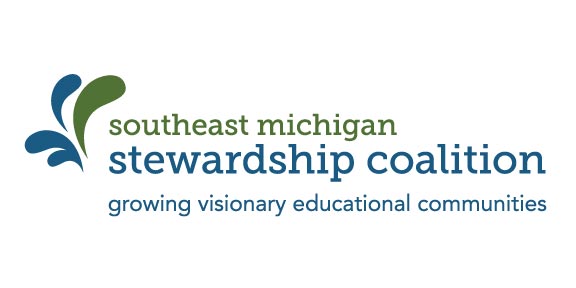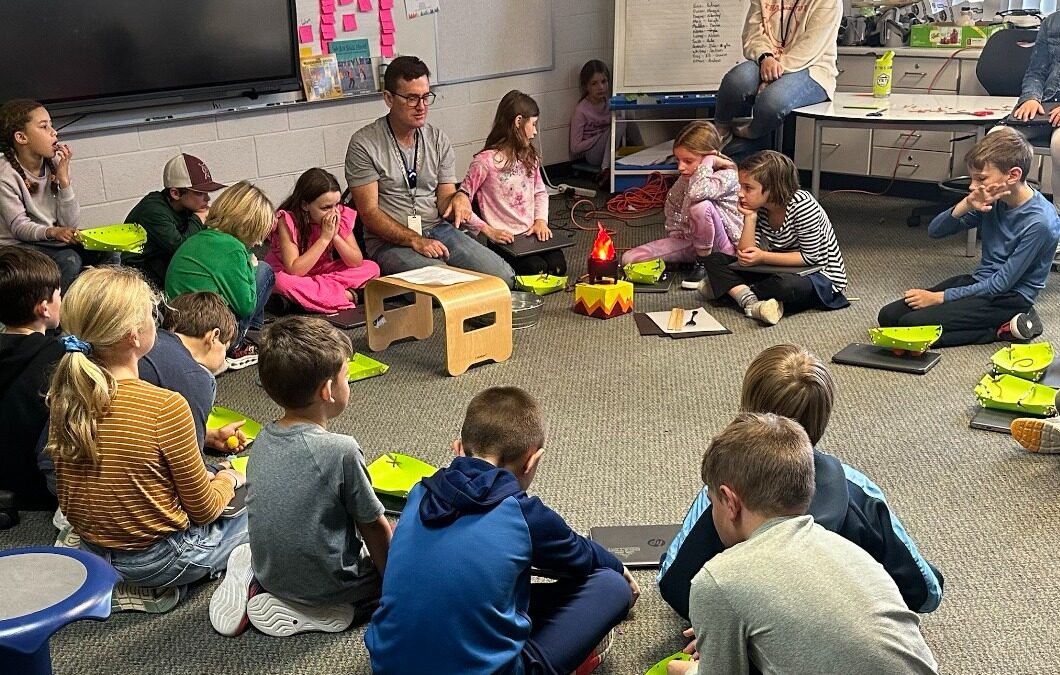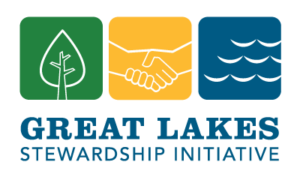
Indigenous Ways of Knowing Initiative Storytelling!

Third grade students and their teacher, Mr. James Barnes in the classroom discussing staple food sources of indigenous cultures in the Great Lakes region.
Why Indigenous Ways of Knowing Initiative
The Southeast Michigan Stewardship (SEMIS) Coalition is a coalition of teachers, community partners, administrators, and students that come together to address social and ecological issues in their classrooms using a place-based approach with an ecojustice focus. The SEMIS Coalition planning team supports teachers through year round professional development and coaching with a place-based approach to center community questions or issues in the teaching and learning processes. During this process, we connect teachers with community partners to support them in enriching their learning to be place-based, student led, and action oriented to lead changes in their community. The SEMIS Coalition uses an interdisciplinary approach and leads initiatives like outdoor education, environmental literacy, and projects related to water and the Great Lakes. One of the initiatives the SEMIS Coalition is leading currently is building community relationships with indigenous scholars and community members to incorporate indigenous wisdom, history, and practices into curriculum.
As we started off this initiative, we made a commitment to ensuring the voices, wisdoms, practices, and experiences of indigenous knowledge holders, tribal members, educators, and researchers are centered in our work with SEMIS Coalition teachers and members. We believe in collaborative processes and building transformational partnerships with our grassroots community partners. This enriches our work and lays the foundation for a place-based approach where community engagement is a critical part. We started building these relationships with our community partners and figuring out ways to center IWOK into the classroom in 2022. Since we have learned so much from our respective indigenous community partners, we want to share what we learned from this collaborative process and invite you to learn directly from our indigenous community partners and a SEMIS Coalition teacher at our upcoming series. Before we provide what upcoming series are focused on, let us give some background information on the start of this collaboration.
Collaborative Work with Jared Ten Brink
One of these collaborations started with Jared Ten Brink. SEMIS Coalition members connected with an indigenous scholar and Ph.D. candidate at the University of Michigan, Jared Ten Brink who has put together a curriculum on learning indigenous food sources that are crucial for community well-being, and that connect people to the land. The curriculum covers the harvesting process of maple syrup and manoomin (wild rice) in Michigan. Jared is a member of the Nottawaseppi Huron Band of Potawatomi and for his dissertation he focused on how to use science to teach indigenous ways of knowing in the classroom. Jared showed interest in working with our teachers and recording the implementation process of his curriculum to use for his dissertation research.
As a result of this collaborative process, Jared Ten Brink, and James (Jim) Barnes, a third-grade place-based educator from Wylie Elementary School in Dexter Public Schools, collaborated to implement this curriculum. The curriculum consists of six lesson plans on indigenous food sources to learn from this wisdom, knowledge, and cultural practices that connect indigenous communities to the land, its significance in community building and well-being from harvest to consumption, and the importance of passing this knowledge to the next generation. James, taught Michigan history through a place-based approach to his inquisitive third graders in 2023-24 academic year and Jared’s curriculum was part of learning history and cultural practices of indigenous people of Michigan. Jared Ten Brink supported Jim to implement his curriculum in the classroom and third graders got first hand learning experience talking to indigenous elders and learning directly from an indigenous scholar about indigenous wisdom, history, food resources, and harvesting practices.
Title: Mno Kenomagwenen: Zisbakwet & Manoomin VR Lessons on Maple Syrup and Wild Rice
- Lesson 1: The Stories of Maple Syrup and Sugar
- Lesson 2: Harvesting Maple Syrup
- Lesson 3: The Seven Fires Prophecy
- Lesson 4: Manoomin and the Ecosystem
- Lesson 5: Harvesting Manoomin and Tool Making
- Lesson 6: Visiting Rice Camp
Expanding James’ Connection to More Indigenous Educators and Tribal Members
As James implemented this curriculum, we have also expanded our relationship with other indigenous tribal members interested in working with our teachers. As a result, James connected with more indigenous researchers and educators to center more indigenous practices and ways of life into his teachings.
One of these connections happened with Amanda Weinert, Ishkaakimikwe Kinoomaagewinan (Teachings of the Earth) Coordinator for Little Traverse Bay Bands of Odawa’s Education Department. Amanda is an education specialist who has connected James to programs that use an IWOK focused approach and supported connections to raise a baby sturgeon in his classroom. This year, Jim is teaching about the native fish sturgeon, and its importance as a food source in the food web while they are watching sturgeon grow in their own classroom. Because of these connections, Jim is expanding his teaching bringing in more indigenous tribal elders to share their knowledge on different topics.
We have deepened our understanding of what is possible to bring land-based practices, that are rooted in centering interdependence of humans with each other and the environment, into the classroom. Thus, SEMIS Coalition is inviting its members to three sequential sessions, two 45 minute virtual sessions and one 2.5 hour in-person dinner and workshop.
SESSION 1: IWOK Initiative Background & Theory
Thursday, October 3, 2024 | 4:30 – 5:15 p.m. (virtual)
The first session in this series will provide background information on the theoretical grounding of the IWOK initiative. Dr. Nigora Erkaeva will discuss her research and the SEMIS Coalition initial efforts to connect teachers to indigenous tribal communities to collaborate in creating socially and ecologically sustainable communities.
SESSION 2: IWOK Initiative Case Study – Wylie Elementary School
Thursday, October 24, 2024 | 4:30 – 5:15 p.m. (virtual)
In the second session of this series, Dr. Nigora Erkaeva will walk us through the experience of a third grade classroom that piloted the IWOK Initiative during the 2023-2024 school year. Participants will learn more about the collaborative experience between a place-based master educator, indigenous tribal member and an educator-researcher, the curriculum on staple food sources of indigenous tribes around the Great Lakes region, and how young people reflected on their experience.
SESSION 3: IWOK Workshop & Community Dinner
Thursday, November 21, 2024 | 5:00 – 7:30 p.m. (in person, location TBA)
*Please note that because there is limited space available for this event, registrations will be prioritized for active teachers within the SEMIS Coalition.
In our final session in this series we will invite a SEMIS master place-based educator and two indigenous tribal educators to give you a glimpse of a teacher’s experience in incorporating indigenous history and science into their curriculum as well as their perspective on collaborating with the SEMIS Coalition in this project. This will be informative and structured, but will also allow for informal discussions about the journey of their collaborative work as it grew and expanded and how other teachers might approach bringing IWOK practices and experiences into their classrooms. Dinner will be provided. If you are not an active SEMIS Coalition teacher but would like to attend the third session, please email Anna Balzer (abalzer1@emich.edu) to inquire if additional spots are available.
The sessions are designed to elaborate on the collaborative processes, learnings, challenges, personal growth, and successes of these partnerships from different perspectives and open it up for other teachers and community members to use this lens in their own learning and teachings. SEMIS Coalition is dedicated to continue this work and open to deepen and extend this reciprocal partnership into transformative partnerships.
If you are interested in attending one or some of these sessions, please contact nerkaeva@emich.edu for more information.
PHOTO GALLERY

James and Jared are teaching history of the indigenous tribes in the Great Lakes region to the third grade students at Wylie Elementary School.



